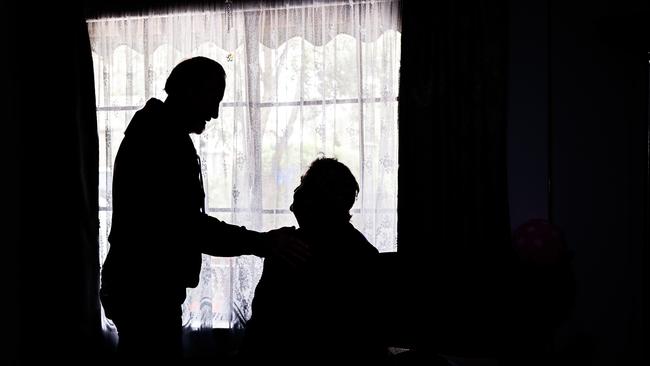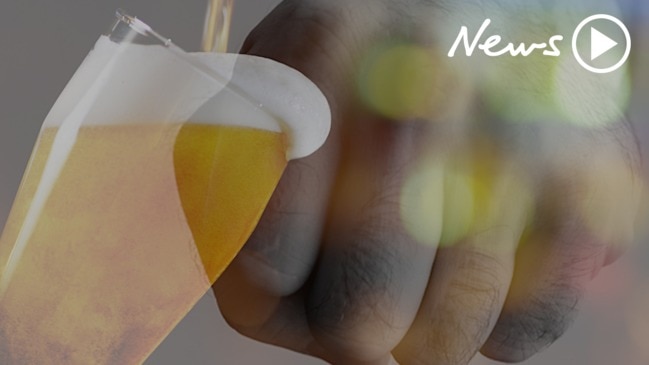Fair Go for Our Regions: Alcoholics Anonymous members share their darkest times — and how they got back on track
Alcoholics Anonymous member ‘Bluey’ felt like a different person when he drank — he had fun with mates, could tell jokes and talk to women. But it also destroyed many aspects of his life.

SA News
Don't miss out on the headlines from SA News. Followed categories will be added to My News.
- Coober Pedy’s bid to bring dialysis to town through Purple House
- Fair Go for Our Regions: Push for birthing support in Roxby Downs
- Drug addicts can’t access help because of funding shortfall: experts
At first, ‘Bluey’ enjoyed a drink with mates — but soon, the negative impacts were much further reaching.
He became addicted, spending time with the wrong crowd and falling foul with the law.
He was sent to boys’ homes and had a brief stint in jail following a range of offences, including driving under the influence, being an accessory to theft, and assaulting a police officer.
“I remember them saying in AA that the first drink does the damage,” the 67-year-old says.
“Once I drank, I stayed a 13-year-old mentally — I never really grew up.
“I threw tantrums and lost my temper.
“I was hanging around with people who would do things like steal stuff from shops and I used to be the person driving the car.”
In 1983, the northern suburbs man began attending AA meetings, and says it was in regional areas that he felt most comfortable seeking help.
“I enjoy the smaller meetings, where you don’t have to stand up in front a crowd,” Bluey says.

Through the fellowship’s support, Bluey has now been sober for almost 37 years and has become much more accustomed to sharing his story with others — particularly the younger members who now look up to him.
“I used to have a pub social life. Now I go to AA for my social life,” he says.
“People think you put the drink down and that’s it — it’s going to be boring.
“But AA is full of life — we have dances and camps and there’s heaps of things for young people do to do enjoy life.”
Bluey now regularly attends meetings north of Adelaide, including several in the Barossa Valley and Mid North.
He says it’s clear that many of the regional groups attract people who have become addicted to other drugs, as well as alcohol.
“Ice is pretty heavy out there at the moment,” he says.
“It just destroys people.
“But it always starts with alcohol.”

Fellow member ‘Annie’, also a northern suburbs resident, lived in mining towns throughout Western Australia at the height of her alcohol addiction.
“My (former) husband was always trying to get me to share a drink with him and I picked up a bottle of wine and I drank the whole bottle,” the 78-year-old says.
“I drank like an alcoholic from my first drink — it was until the bottle was gone.”
Annie says as a child, her family led a regimented life, and her father was a strong disciplinarian, so once she left home she became very “undisciplined”.
“When I drank, I would drink and drink until I passed out. I was picking up a drink as soon as I got out of bed.”
She recalls a time when she worked as a waitress and at the end of each shift, she and the venue’s cook would finish off all the bottles of wine left on tables.
Her light bulb moment came when she visited her local doctor, who told her he was at a loss to help her improve her health.
“It was a spark, of ‘I’ll show you’,” she says.

Finding support in the Pilbara was difficult, Annie says, and she felt isolated in her search for help.
Annie had to travel more than 300km to attend her first AA meeting and later helped set up several other groups as she moved around the country.
She says alcoholics must feel a desperation to stop drinking in order to find success, and she has found “you have to replace the thirst for drinking with the thirst for AA and recovery”.
These days, Bluey and Annie are both senior members in their groups, relishing the opportunity to help others struggling with booze.
“We care for each other and share our stories, experiences and hopes,” says Annie, who is also in her 37th year of sobriety.
“That’s why the old timers keep coming back because we have a lot to give the young ones — and they have a lot to give us too.
“It reminds us of where we’ve come from and where we are today and it keeps us humble.”
Alcoholics Anonymous offers meetings at a range of places across the state. Visit aa-sa.org for details.
*The Advertiser has not published Bluey and Annie’s real names.


